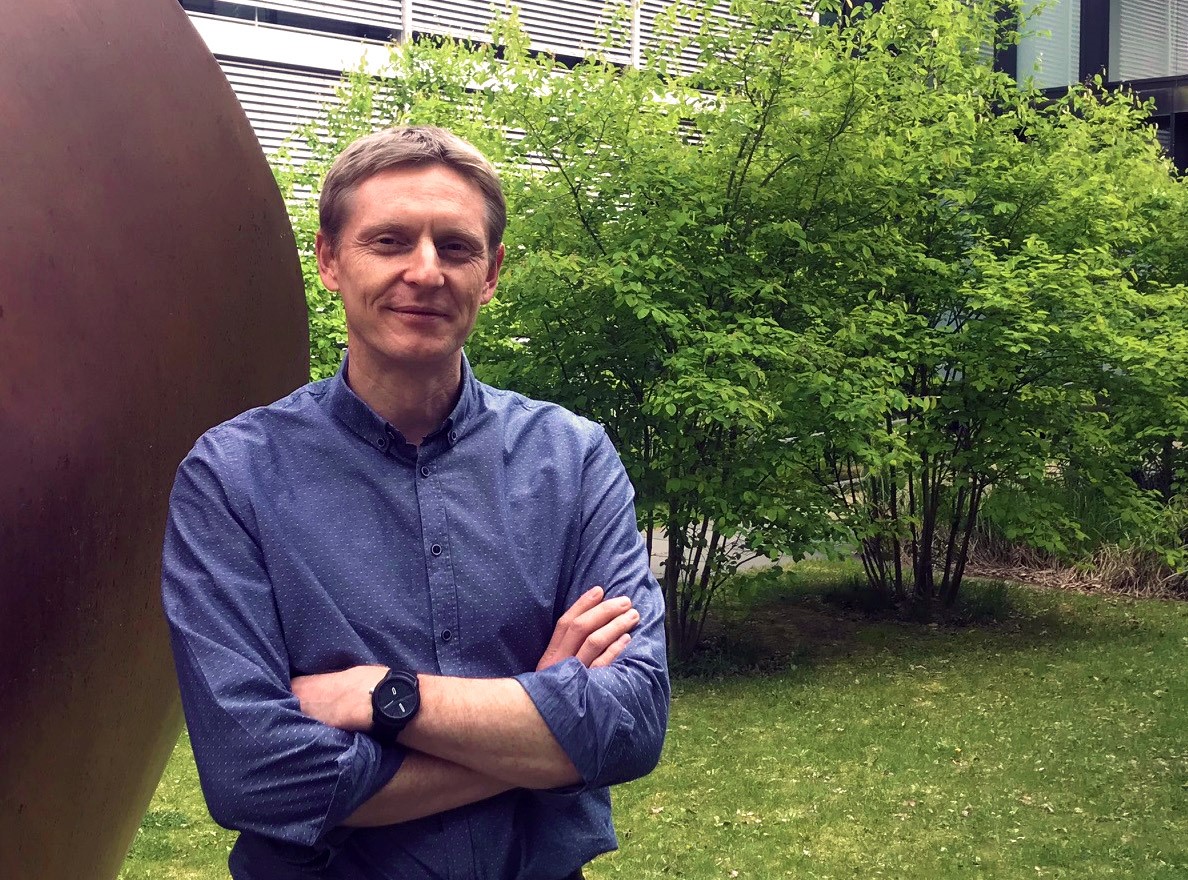Gunter Meister: “We are currently experiencing a really exciting period of RNA biology”


What do you consider the most formative phase of your research career?
I think all different phases of a scientific career contribute to the development and formation of a scientist. It may even start in school, where a charismatic teacher can get you excited about biology. This was certainly true for my career. But the most important phases were my PhD thesis, which I did with Utz Fischer at the Max-Planck-Institute of Biochemistry in Martinsried, and my postdoc with Tom Tuschl at Rockefeller in New York. My PhD allowed me to develop my experimental skills, learn how to design projects and also have the freedom to try new things. Most of them did not work but it was very important for me to find out what is possible and what not. During my postdoc, I become more independent and learned how to publish and discuss with editors. I also got to know many editors of high-impact journals in person, which is still relevant for our work now. When looking back, I think the way we organize our research as well as our team is a mixture of what I learned from my mentors during my PhD and postdoc. There are certainly personal aspects added over the years, but these two phases were most formative for me.
What’s exciting in the field right now?
The importance of RNA-guided gene regulation has been recognized for a long time. Its mis-regulation in diseases was also realized very early on and targeting RNA for therapy has been proposed. This is very exciting since targeting of RNA sequences with antisense molecules is rather straightforward and easy to design. However, for a long time there was only marginal progress and delivery turned out to be a major obstacle. In 2017 and 2018 two RNA-based drugs were approved by the FDA: Nusinersen is an antisense RNA that targets a splice site and corrects mis-splicing in the genetic disease Spinal Muscular Atrophy (SMA), which mainly affects young children; and Onpattro is the first siRNA-based drug for treatment of a genetic liver disease. We are currently experiencing a really exciting period of RNA biology. Proof-of-concepts are there and targeting RNA for therapy has become a reality! I am convinced that we’ll see many more such drugs in the near future with great benefit for patients.
Can group leaders still find time for hands-on research?
I think they can. As a junior group leader, I used to continue to work on some of our projects when I started my own group. But since I had to do (or I did) many other things, the projects got slower and slower, which was not very satisfying for me. So I put all projects into the hands of students and postdocs, who were very talented and it worked out pretty well. I recently read an interview of Joan Steitz, where she mentioned that young group leaders are their best postdocs and should continue working on the most important projects themselves. I could not agree more. This also positively affects the lab atmosphere since not all pressure is on the co-workers.
What aspects of your life as a researcher do you most enjoy?
Freedom. We can decide what research topics we are working on and our research is clearly curiosity driven. We can go to meetings to foreign countries and discuss our work with colleagues. We get to know a lot of people in many different countries and we can even collaborate with them and work on a specific problem together. This is one of the most pleasant aspects of our work. Working with young students and postdocs is also very enjoyable. In our lab, we have people from different countries and with different cultural backgrounds, which broadens our view.
Can/should biochemists / molecular biologists / cell biologists be interested in research beyond their own area nowadays?
Absolutely! Research fields become more and more detailed and it is sometimes very difficult to catch up with the literature that is generated. Nevertheless, major novel developments and ideas are often apparent when leaving our own scientific niche and exploring how other fields tackle scientific problems. Such open-minded glimpses of other areas may lead to novel ways of thinking about a problem or to the development of novel and superior technologies.
Pure or applied research?
Of course ‘pure’! Most of the technological developments and scientific breakthroughs over the past 50 years have been achieved without political ‘guidance’. Imagine CRISPR. If researchers had asked policy makers whether they could get funding for a project on repetitive genomic sequences in bacteria and archaea, the policy makers may not have been very happy about it... And now it is changing our lives.
What worries you about life sciences research currently?
Life science research has become too much of a ‘business’ with standard ‘career plans’ based on publication numbers for example. Very often, standard tools are applied without asking deeper questions and an enormous amount of literature is generated. Too frequently, such publications report on marginal progress and it is almost impossible to follow the literature even in smaller research fields. Many studies are also not always fully reproducible as detailed examinations have unravelled and this questions our entire research system. These developments worry me most these days since each lab starts to build its own track record only relying on data that has been generated in its own lab. I find this worrying since the idea of basic science is that a global community works together on specific questions and problems. Open discussions at meetings become rather rare and only already accepted data is presented, which was never the intention of scientific meetings. One should keep in mind that an enormous amount of taxpayers’ money goes into such meetings and conferences. We should overcome these issues and find our way back to adventurous, curiosity-driven research, not only relying on standard tools but also developing novel sometimes even unorthodox ways of experimental research.
Introduction to Gunter Meister's work
Research summary
Gunter Meister’s lab works on various aspects of RNA-guided gene silencing. The lab investigates the molecular mechanisms underlying microRNA-guided gene regulation. Another focus is on the characterization of RNA-binding proteins (RBPs) in miRNA maturation but also in RNA metabolism in general. RBPs are frequently mis-expressed in disease and the lab has started to investigate the role of this large protein family in various diseases including cancer. Finally, RNA modifications on mRNAs contribute to gene expression. The lab has generated antibodies against base-modifications such as m6A or m5C and uses these tools to profile RNA modifications on a broader scale. Enzymes important for such modifications are biochemically and structurally investigated.
Lab webpage: www.uni-regensburg.de/biologie-vorklinische-medizin/biochemie-1/
Two recent/key papers:
Treiber T., Treiber N., Plessmann U., Harlander S., Daiß J.-L., Eichner N., Lehmann G., Schall K., Urlaub H. and Meister G. (2017) A compendium of RNA-binding proteins that regulate microRNA biogenesis. Molecular Cell 66, 270–284, doi: 10.1016/j.molcel.2017.03.014
Hasler D., Lehmann G., Murakawa Y., Klironomos F., Jakob L., Graesser F.A., Rajewsky N., Landthaler M. and Meister G. (2016) The Lupus autoantigen La prevents mis-channeling of tRNA fragments into the human microRNA pathway. Molecular Cell 63, 110–124, doi: 10.1016/j.molcel.2016.05.026
More information on the FEBS Theodor Bücher medal and plenary lecture at the FEBS Congress
The Theodor Bücher medal is awarded annually by FEBS for outstanding achievements in Biochemistry and Molecular Biology or related sciences: www.febs.org/our-activities/awards/medals
Gunter Meister will be presented with the medal at the 44th FEBS Congress in Krakow, Poland on Tuesday 9th July where he will deliver a lecture on ‘Regulation of gene expression by RNA-binding proteins and non-coding RNAs’: 2019.febscongress.org
Top image of post: snoRNA (small nucleolar RNA)-inspired artwork generated in the lab of Gunter Meister. The imagery also featured on the cover of Molecular Cell (Vol. 32, issue 4) on publication of a paper from Gunter Meister’s lab: Ender, C. et al. (2008) A human snoRNA with microRNA-like functions. Mol. Cell 32, 519-528, doi: 10.1016/j.molcel.2008.10.017





Join the FEBS Network today
Joining the FEBS Network’s molecular life sciences community enables you to access special content on the site, present your profile, 'follow' contributors, 'comment' on and 'like' content, post your own content, and set up a tailored email digest for updates.